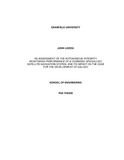JavaScript is disabled for your browser. Some features of this site may not work without it.
| dc.contributor.advisor | Bowling, Tom | |
| dc.contributor.author | Loizou, John | |
| dc.date.accessioned | 2007-04-16T12:28:12Z | |
| dc.date.available | 2007-04-16T12:28:12Z | |
| dc.date.issued | 2004-03 | |
| dc.identifier.uri | http://hdl.handle.net/1826/1604 | |
| dc.description.abstract | In 1999 Europe, through the European Commission and the European Space Agency, began detailed definition of a second generation Global Navigation Satellite System (GNSS). This GNSS development programme, known as “Galileo”, was intended to both complement and compete against the existing US Global Positioning System (GPS). Unlike GPS, Galileo is intended to be privately financed, following the initial development investment from the EC and ESA, which implies that Galileo should provide some revenue-earning services. From its earliest inception, the basis of these services has been assumed to be through the provision of Signal Integrity through an Integrity Flag broadcast through the Galileo system– a service which GPS cannot provide without some external system augmentation. This thesis undertakes a critical evaluation of the value of this integrity system in Galileo. This thesis has two parts. The first demonstrates that the conditions required to attract adequate private finance to the Galileo programme are incompatible with the system architecture derived from the early Galileo system studies and taken forward into the system early deployment phase, which includes an Integrity system within Galileo. The second part of this thesis aims to demonstrate that receivers which can combine the signals from GPS and Galileo may offer a free Integrity service which meet the needs of the majority of users, possibly up to the standards required for aviation precision approach. A novel Receiver Autonomous Integrity Monitoring (RAIM) technique is described, using an Errors in Variables/Total Least Squares approach to the detection of inconsistencies in an over-determined set of GNSS signal measurements. The mathematical basis for this technique is presented, along with results which compare the simulated performance of receivers using this algorithm against the expected performance of Galileo’s internal integrity determination system. | en |
| dc.format.extent | 7560136 bytes | |
| dc.format.mimetype | application/pdf | |
| dc.language.iso | en | en |
| dc.publisher | Cranfield University | en |
| dc.rights | © Cranfield University 2004. All rights reserved. No part of this publication may be reproduced without the written permission of the copyright owner. | en |
| dc.title | An assessment of the autonomous integrity monitoring performance of a combined GPS/Galileo Satellite Navigation System, and its impact on the case for the development of Galileo | en |
| dc.type | Thesis or dissertation | en |
| dc.type.qualificationlevel | Doctoral | en |
| dc.type.qualificationname | PhD | en |
